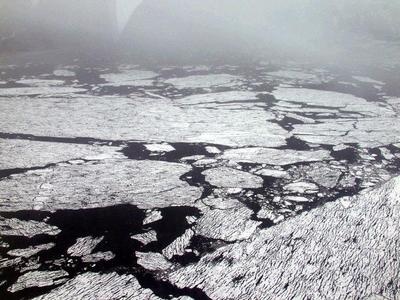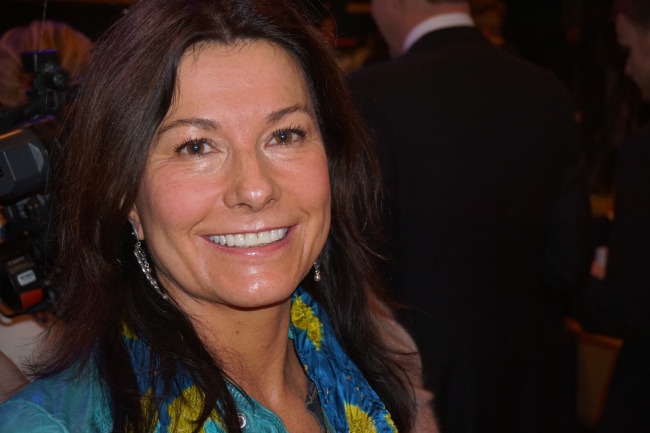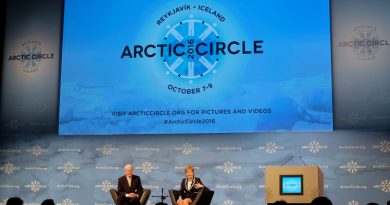‘Arctic oil is incommensurate with 2ºC target:’ WWF

TROMSØ: Norway’s decision to offer more Barents Sea drillings would be incommensurate with efforts to limit global warming to 2ºC, says Samantha Smith of the WWF.
Air temperatures rising, sea ice melting, snow cover declining, permafrost warming, glacier retreat accelerating, ocean surface warming, air temperatures rising and Greenland ice sheet melting. The list of evidence for global warming is long.
Speaking at the Arctic Frontiers conference in Tromsø, Samantha Smith questions the arguments from the Norwegian government that the high north of the Barents Sea is ice-free enough and ready for drilling.
“One thing we know for sure about the ice-condition in in the Arctic is that it is becoming more and more unpredictable as a result of climate change,” she says. Smith is leader ofWWF Global Climate & Energy Initiative.
Half a year after the original schedule, Norway’s 23rd License Round was announced on Tuesday. It includes 57 blocks, of which 34 are in the formerly disputed Barents Sea waters with Russia.
40 oil companies have voiced their interests for licences in the 23rd Licenses Round. The companies will have to post applications by December 2nd this year and the government aims to award new production licences in the first half of 2016.
“We think this is a wrong decision,” says Samantha Smith calling for a green shift in the white north.
“We would like to encourage all Nordic leaders to show the rest of the world what sustainable economy looks like. Right now, they need to show leadership, we are in the middle of a transmission from oil economy into new renewable energy sources.”

She points to a recent report by the International Energy Agency (IEA) saying development of resources in the Arctic and any increase in unconventional oil production are incommensurate with efforts to limit average global warming to 2ºC.
The 2ºC limit is agreed by UN science panel on climate changes as the absolutely maximum the world can live with before unpredictable catastrophic consequence will come.
WWF encourages all Nordic leaders to show the rest of the world what sustainable economy looks like. “Right now, they need to show leadership, we are in the middle of a transmission from oil economy into new renewable energy sources,” Samantha Smith says arguing that environmental sustainability is a precondition for economic sustainability in the north.
The oil companies that want to test-drill for oil in the Barents Sea get 78 percent of the costs covered by the government in tax refund. An average test drill on the Norwegian continental shelf had a price of NOK 600 million (€68 million) in 2013 of which NOK 500 million (€57 million) then are subsidised by the state.
With five test-drills at each license, the state subsidies are then NOK 2,3 million (€261 million), which means a total subsidy of the coming Barents Sea oil drilling with NOK 126 billion (€14,3 billion), according to calculations made by WWF Norway.
“The Norwegian government is gambling with 126 billion tax kroner in the Barents Sea,” Samantha Smith says agreeing with investor Jens-Ulltveit-Moe that on Arctic Frontiers warned the Norwegian Government against state investments in White Elephants.
“Those licenses will be licenses to losing money,” Jens Ulltveit Moe says as reported by BarentsObserver.
Related stories from around the North:
Canada: Will Russia’s actions in Ukraine affect relations in the Arctic Council?, Eye on the Arctic
Finland: Rouble collapse hits Finland, Forex stops buying Russian currency, Yle News
Greenland: Arctic oil and gas must stay in ground to restrict warming to 2°C says study, Blog by Mia Bennett
Iceland: From Arctic Circle 2013-2014, a big drop in the price of oil, Blog by Mia Bennett
Norway: Currency drama has little impact on tourism in Barents region, Barents Observer
Russia: Russian crisis money for Novatek’s Yamal LNG project, Barents Observer
Sweden: Falling oil prices benefit Sweden, Radio Sweden
United States: World oil price decline siphons billions of dollars expected by Alaska, Alaska Dispatch News



